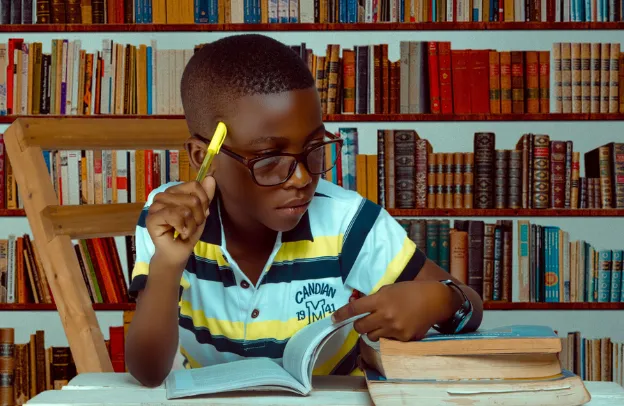How Memory-Based Learning Techniques Boost Classroom Confidence and Academic Success in Africa

What if the secret to classroom confidence isn’t in a textbook or a tablet, but already alive inside a child’s mind? Picture a classroom in rural Africa. A young girl stands before her peers and shares a story passed down from her grandfather. Her voice is steady. Her classmates listen. The teacher nods with pride. She doesn’t have the newest books or digital devices, but she has something far more powerful: memory. And from that memory, confidence blooms.
Learn How to Leverage Your Story through our Story To Asset Framework.
Across Africa, memory has long been more than a cognitive skill, it’s a cultural cornerstone. In communities like Esanland in southern Nigeria, children are raised on stories, proverbs, and songs.
These memory-rich traditions do more than entertain. They help children think clearly, speak boldly, and believe in themselves, skills that matter just as much inside the classroom as they do outside it.
Memory Builds Belief
Confidence begins when a child feels secure enough to say, “I can do this.” But for many students, especially in under-resourced schools, confidence is often the first casualty of academic pressure. Memory-based learning changes that.
When children learn through oral storytelling, rhythmic songs, and repetition, they build strong memory pathways, and with each success, their self-assurance grows. Retelling a story, reciting a proverb, remembering key details; each of these becomes a moment of pride and proof that they are capable.
UNESCO’s Institute for Lifelong Learning supports this: children who learn through culturally grounded methods, like storytelling and repetition, perform better academically and stay in school longer. These methods are not supplemental. They are essential.
If you are interested in building memory for children, here are three effective methods to consider:
1. Storytelling and Narrative Techniques
Engaging children with stories, whether oral, written, or visual, helps them connect new information to familiar concepts. Stories give context and emotional resonance, making facts easier to remember.
You might also like Reclaiming Roots Through Agritravel & Storytelling: A Powerful Gathering of African Diaspora Voices.
Example: Teaching history through personal or cultural stories rather than abstract dates helps children retain and understand complex ideas.
2. Repetition Through Play and Routine
Repetition solidifies memory, and incorporating it into games, songs, or daily routines makes it fun and natural. This method strengthens both short-term recall and long-term retention.
Example: Using memory-based games like “Simon Says” or repeating cultural songs and rhymes helps reinforce learning while keeping children engaged.
3. Hands-On Learning and Visual Aids
Children remember better when they actively participate. Using crafts, role-play, drawing, and visual aids like charts or memory maps engages multiple senses, which enhances memory retention.
Example: Creating a family tree or building a model of a historical site helps children make tangible connections to abstract concepts.
Esanland: Where Memory Is Mastery
In Esanland, elders are keepers of knowledge. Through proverbs or “itan” in Esan language, ancestral stories often passed down in Esan language, children absorb wisdom not by rote, but by heart. They don’t just listen; they retell, reenact, and remix these tales with song, dance, and improvisation.
This method teaches more than content. It builds focus, strengthens verbal skills, and encourages critical thinking. It also lays the emotional groundwork for children to raise their hands, share ideas, and lead conversations.
In this way, memory becomes more than mental recall; it becomes a foundation for confidence. The following is a list of popular Itan from The Illustrated Dictionary of Esan Language (unpublished), by Iseribhor Okhueleigbe.
- Ose ii gba ni usẹnbhokhan. (A young man’s beauty is never without defects.)
- Eji Aah nyẹlẹn ọhle Aah khọ. (People resemble where they live.)
- Udo ni Aah daghe ọ’ vade ii degbi ọrhia bhi ẹlo. (A stone that one sees coming does not blind one.)
- Eji ọboh da gui otọ ọhle ọle da horiẹ. (A native doctor disappears only where he is used to.)
- Aah ii ri ebi Aah nanọ bui awa re. (You don’t tempt a dog with something to lick, since a dog is an avid licker.)
- Aah gheghe yọ ni olimhin kha mhẹn bhi ẹlo, ọhle Aah da ri ukpọn bhọ. (Clothing a corpse is simply to beautify it.)
- Aah ii fi ini bhi otọ kha khin oha-ọtan. (Do not go hunting for squirrel while you have an elephant as a catch.)
- Aah ii di isira ọnọ khin eni khin ẹkpẹn. Or, Aah ii khin ẹkpẹn man ọnọ khin eni. (You don’t change to a tiger in the presence of one who can change to an elephant.)
- Amẹn ni ọrhia la muọn ii gbera ọle a. (The water one would drink can never flow past one.)
- Aah ii yi ọbhẹnbhẹn khui ọkhọh. (Do not ask a mad man to chase fowls away, since he would do it madly.)
- Ene wwue bhi uwa kha yyọ ele mmin okpodu, Ebi ene wwuẹ bhi ole ki da ta yẹ. (What would they say who slept outside if those who slept inside complained of harassment?)
- U’u ii ji Aah gui na. (Death is impervious to appeal.)
- Ẹwa’ẹn Aah rẹ gbi efẹn nọ ribhi ẹkẹ akhe. (Killing a rat that is holed up inside an earthen pot requires wisdom.)
- Ufẹmhẹn si obhokhan kha na, Aah ki yọ owualẹn kkani ọhle ni ọle. (When the arrow from a child’s bow travels far, an adult is suspected to be responsible.)
- Ọnọ gbi ọnọdeọde ọhle ọnọdeọde viẹ bhi itolimhin. (In a funeral, each mourner mourns the fate that befalls him, not the deceased’s.)
- Ọmọn nọ yyu ọle mhọn ose nẹ. (It is the deceased child that is always the prettiest.)
- Ohu bha lẹn ebialẹn si ọhle. (Fury does not know its owner’s strength otherwise, a weakling’s rage would be tempered with restraint.)
- Agbọn khi ese. (It is human beings that disguise themselves as supernatural forces.)
- Ọnọ ii ribhi eni, ọle Aah ri enyan si ọle tọn bhi egbi era’ẹn. (It is the absent one whose yam would always be kept beside the fire.)
- Eto kha rẹ re, Aah yẹ lẹn eji ukẹhae nae. (No matter how hairy the head becomes, the forehead remains distinct.)
- Aah kha yọ ni Aah sikoko, Aah bha yyọ ni Aah simama. (A call to gather together is not an invitation to muddle together.)
- Aah kha khin ẹkpẹn fo, ebi Aah khiẹn ki fo. (After changing to a tiger, you simply have no other thing to change to.)
- Aah kuẹ ri ikhilẹn khin ẹgua’e ọba, ọba kuẹ nyẹn uge. (The king need not tiptoe in order to peep at a dance coming to be staged at his palace.)
- Ọni Aah bbhobholo ii bhobhi ọrhia. (The one who is carried on one’s back cannot back someone else.)
- Oẹ ọkpọkpa Aah zẹ bhi okọ-ẹdin. (In a palm oil dish, you take one step at a time.)
- Irẹlobhegbe zzẹ ni ọkhọ bha da lli afiamhẹnh. (But for forbearance, the chicken would have taken to eating birds.)
- Ose ba ni emiamhẹn. (Beauty is more painful than infirmity.)
- Ọnabhughe ọ’ min olimhin ni Aah ri izagan mun. (It is the truant that comes in contact with a corpse wrapped in a basket.)
- Aah ii ri ẹbhe ni oruan ọrhia rẹmhọn. (To ensure a lasting relationship, do not offer a goat to your in-laws for safe-keeping.)
- Aah kha kha gbi ugan bhi evele, Aah ki ri ukpọn bhọ re. (If it is being debated, a man should undress to counter claims that he is suffering from penile bloat.)
- Ebi Aah bha mmin Eboh, Aah bha rruẹn ebeh-ọghẹdẹ. (Prior to the arrival of Europeans, no one wore banana leaves, but clothes.)
- Ẹnyẹn ni otuan ọkpa miẹn ọhle khi ubhiọ. (It is the serpent seen by a single person that is called a lizard.)
- Uhọmhọn na ji ikọ ọ’ ii gbi ikọ. (An envoy isn’t punished for the message he conveys.)
- Ọkhin ẹkpẹn ii khin eni. (He does not change to a tiger once he changes to an elephant. Or, Everyone has an area where he is talented.)
- Aah kha rui ẹlo, Aah ki kha ri ẹwua’ẹn khian. (Blindness demands caution. Or, When one is blind, one learns to walk with care.)
- Afiabhẹn ni Aah ri igẹnh si ọhle lui emhin, ẹjẹje Aah min ọhle ele. (The bird whose feathers are treasured must walk circumspectly.)
- Ebe bha ji ọrhia rẹ lẹn egbe, ọhle ọrhia da tẹ. (Disgrace is sure to come from that over which one cannot exercise self-control.)
- Ebe yi okhuo zẹ bhi ileghe re, akun ọ’ ye. (That which compels a woman to reduce her waist beads lies in her waist.)
- Ọ’ ii yi ọta ni ekhẹnh ta yi ẹki, ọ’ ii yi ọhle ele ta vae. (Traders’ subject of discussion to the market differs from their homeward discussion.)
- Ọ’ ii yi ẹdẹ ni Aah muin ure ọ’ ii yi ẹdẹni Aah ri ọhle zọ ese. (It is not the same day a snail is found that it is offered as sacrifice to an idol.)
- Eji Aah tan sẹ, ọhle Aah da ji uhọmhọn. (A person’s head must grow where his height stops.) nearly LIT
- Ure kha lo bhi ẹbọ, ọ’ ki khin ẹbọ. (When a snail inhabits a shrine, it becomes an idol.)
- Ọsakọn Aah lẹlẹ, Aah ii lẹli ọmeto. (It is the dentist that can be tricked, not the hairdresser.)
- Odin ii talọ, ọta ri ọle bhi unu. (Although speechless, the mute has something to say.)
- Ojie ii gbo yọ ni Aah ri ojie tọ bhi itikun. (A king never asks a king to be buried in a refuse site.)
- Okhuẹlẹn nẹko kpe. (A grass-cutter’s plumpness is achieved in hiding.)
- Ẹmhọn ri ọdan ba bhi egbe, ọhle rri ikpea do bhi omin. (LIT)
- Ọbo ii bọ bhi ebi ọle lẹ’ẹn. (A native doctor doesn’t consult his oracle concerning that which he knows.)
- ‘Nine’ bha jji Ebo llu. (Despite his ingenuity, the white man could not create the number nine.) nearly LIT
- Elamhẹn n’ọ ii mhọn akọn, ọhle ki odalo bhi ishi oyi. (It is the toothless beast that is always the first arrival at the orchard.)
- Usẹn bi usẹn ko yi egbe ‘halo’. (It is age mates that greet each other with ‘hello’.)
- Ẹdebe ọhle Aah rẹ ye ọkha’e re. (A hero is often remembered on a bad day.)
- Ọ’ ii yi ọnọ ka kha khọmhọn ka yu. (The first person to fall sick is not always the one to die first.)
- Ọbo kha wuo ni ọbo, ọ’ ki ri ọbo khuọn ẹkpa. (LIT)
- Ogun bi ogun kha min egbe, ughamhan ele rẹ tui egbe. (When blacksmiths meet, both salute each other with iron.)
- Aah kha kha viẹ, Aah yẹ daghe. (Even in tears, it is not impossible to see.)
- Ẹghe ni Aah bha rẹ llẹn ẹlo ikpakpa, ọhle ikpakpa ki rẹ ggbi ọrhia. (Men only died of toxin beans when they lacked knowledge of the food.)
- Okhuo ii yi okhuo biẹre khi ọmọn fui ọlle bhọ. (A woman doesn’t ask a fellow woman to put to bed that she herself is childless.)
- Ẹruẹ ii yi ẹruẹ ọyabhihue. (English version: ‘A kettle does not call a kettle black.’)
- Ebi Aah miẹn ofẹn ii muin uki, Ebi ọhle ii da bha ọsi adamhẹn. (If not for fear, why doesn’t the moon shine in the daytime?)
- Ẹlo ọriọbhe bhia’e, ọle ii rẹ daghe. (Although he has good eyesight, a stranger doesn’t see with his eyes.)
- Ọnọ rẹre, ọle Aah da ọle obọ. (It is the generous person who would always be approached for assistance.)
- Ọriọbhe giẹrẹn lumhin eman, ọle bha lẹn eji Aah ri ubhokọ gọ. (Although a stranger pounds yam well, he lacks knowledge of where to keep the pestle.)
- Aah ii ri emhin ni ọkhian re mhọ’ẹn. (You don’t give something to a traveller to keep.)
- Ẹdẹ ni okhuo rẹ nyin eman ebe, ẹdẹni ọlle rẹ le nẹ. (It is on the day a woman cooks a bad meal that she eats best.)
- Elamhẹn ọbhebhe ii ni isọn emẹdin ebeiyi uriẹi. (Except porcupine, no other animal has palm waste in its excreta.)
- U’u bha gbi iban, ọhle di khin ẹdin. (The flower of a palm tree will eventually become palm nuts if death spares it.)
- Oghian ọrhia zẹ ni u’u da ba bhi egbe. (It is one’s enemy that makes death hurtful.)
- Obhokhan kha ni isọn ebe, Aah ki ri ebe ugbolimhosaka gbo ọle uwedin a. (If a child defecates repulsive excreta, the leaf of a spiky plant will be used to wipe his buttocks.)
- Aah kha kha gbi ugba, ọtẹtẹh rie. (At the repeated shaking of the calabash, insects find their way out.)
- Aah bha min ebi Aah khin ọkhọmhọn yẹ, Aah ki zaghi ọle era’ẹn a. (If because of his illness, you can’t hurt a sick person, you can at least extinguish the fire that keeps him warm.)
- Aah bha min ebi Aah khin ojie yẹ, Aah ki si ọle bhi ẹbho re. (If, because of his power, you can’t challenge a king, you should quit his kingdom. Or, cf. ‘If you live in Rome, do not strive with the Pope.’)
- Ẹghe ni Aah rẹ llui ẹmhọn, Aah rria ọhle a. (The time spent on lawsuit is time wasted.)
- Aah kha ri egbe yi isi ojie, ọshọ folo. (When people take themselves to the king’s palace for a lawsuit, they cease to be friends.)
- EJi uzo ki ri aho ọ ni ọhle da rẹ bi iweva. (From where has antelope got the strength to give birth to twins?)
- Ukpokpo ni Aah rẹ ggbi ẹwobi, Aah bha refia, Aah ki rẹ gbi ọbhata. (The whip that was used on a stupid person, if it is not disposed of, will be used on an innocent.)
- Aah ii min ebe khi ọkhọ ebeiyi akhokholẹ. (Nothing resembles a chicken as does a bush fowl.)
- Ese kha la zi emhin, ẹkẹn-ọkhọ ki va udo a. (When supernatural forces are at work, it is not impossible for a hen’s egg to crack a stone.)
- Ebe ka llui ọkhọ di yẹ lui ẹbhe. (A goat will by no means escape the fate of a chicken as long as feasts last.)
- Ọkpọkpa Aah gbe ni okhọ’ẹn da lọ. (A war is sustained till the end by gradual killing rather than by outright annihilation. Or, cf. English version: ‘Rome was not built in a day’ or ‘One thing at a time.’)
- Aah ii dunu bhi igbanaka. (LIT)
- EJi ehọ ni Aah la rẹ họn, ọhle Aah nẹ emhin na. (The very fact that certain things are offensive to the ear is the reason they are considered taboos.)
- Ojie kha la le, ọ’ ki zi ọgbọn re. (A king’s ascension to the throne is initially followed by fundamental changes.)
- EBi Aah la le ẹlẹna, Ebi Aah la le akha, ọhle ukhumhun rẹ fo. (The question of today’s meal and tomorrow’s provision is how a famine abates.)
- Aah ii ri afe nani umhẹn. (You don’t start licking salt simply because you are wealthy.)
- Aah ii nọ ọnọ mhọn igho bi ọle la dẹ. (You don’t ask the moneyed man what he will buy with his money.)
- Ẹsọn ka ggbi enefe. (The rich once suffered hardship.)
- Ẹbọ kha kha to, ọhle mhọn ohẹn si ọhle. (No matter how austere an idol is, it has its priest who pacifies it.)
- Ọkaleteh ii kpọ. (Heroes are hard to find.)
- Ughe ughulu da ho ukhuọ ọhle ni Aah kha yọ ghe khi ẹkẹ ọhle mun ni ọhle. (That hawk makes love to its wife in the open sky is to debunk rumours that it impregnated her out of wedlock.)
- Aah ii ri ugbele si Akogho loli ugbele. (LIT)
- Uhẹn-ẹlẹ zẹ ni Aah ii da nẹ bhi ẹki. (Don’t defecate in a marketplace because it will be there for you to see on the next market day. Or, cf. English version: ‘The evil that men do lives after them.’)
- Ẹwa’ẹn Aah rẹ gbi udia nọ timan bhi ikpẹkẹn. (Killing a tsetse fly that perches on one’s scrotum demands wisdom.)
- Uhọmhọn ni Aah bha ji obhokhan ele, ọhle kha gbi ache bi uwawa bhọ, ọhle ki ha osa. (A child must pay for the destruction of items that result from carrying out a task that was never assigned to him.)
- Uzehia kha zẹ bhi eji obọ ii sẹ, Aah ki yi ọhle lala a. (If one has boil in a part of the skin beyond reach, the boil is advised to rot.)
- Aah ii gẹn ọmọn bhi isira ọle. (Don’t sing praise of a child in his presence.)
- Emhinh erebhe ne ribhi omhọn ti egbele itata. (Every ingredient in soup likes to be seen as meat.)
- Ọ’ ii yi ẹlo ni Aah rẹ lie man, ọ’ ii yi ọhle Aah rẹ kha elamhẹn. (The attitude with which food is eaten differs from that with which meat is shared amongst the eaters.)
- Ese kha la zi emhin, omhọn ni inodẹ ki oto obọ a. (It becomes possible today for yesterday’s soup to burn one’s hand once supernatural forces are at work.)
- Ọ’ ii yi ẹlo ivin ivin rẹ ni udẹn. (A palm kernel would never produce palm ointment unless under the searing heat of the pot.)
- Aah ii ni ọnọ wuẹle gbi ugan si ebhohiẹ. (You don’t argue about a dream with its dreamer.)
- Ọbhẹbhẹn yyọ ghe khi ena ọle rri era’ẹn fiọ, ghe ọnọ to khian ni ọle bha lẹn ẹlo bhọ. (A madman only knows of the spot where he dropped fire but cannot account for the offshoot ravaging the forest.)
- Aah kha rẹkhan ẹkpẹn khian, Aah ki li elamhẹn; Aah kha rẹkhan ẹbhe khian, Aah ki li ebeh. (A companion of tiger will feed on meat, but a companion of goat will eat leaves.)
- Ebale kha sike ebgi unu gbe, ọ’ ii ji Aah le. (Food that is too close to the mouth is difficult to eat.)
- Ọba ii de Esan, Ọzọloa ii ri Ẹdo. (No Benin monarch visits Esan land, just as Ọba Ọzọloa, who was slain in Esan, will never return to Benin.)
- Ọgbihiagha bhi uhọmhọn nain ọka yyọ ghe ọhle lẹn otu si ọhle. (The dreadlocked maize insists it knows its age mates.)
- Evẹkpẹn kha vi ẹkpẹn fo, Ibhioba ki bi ebeh. (The people of Ibhioba clear the leaves after the butchers of tigers are done.) nearly LIT
- Eni ediọn kha le, enai ẹlimhin ki khọn. (When the elders eat, the spirits are full.)
- Ọnọ ii mhọn ọmọn ii mhọn oruan. (The one who has no child cannot have an in-law.)
- Ọnọ ri ebeh bin uwa kha dia khẹ efi. (He who builds a house with leaves should expect the storm.)
- Aah gbudu yi ọba ‘họ’ọ’! (Even the king can be reprimanded.)
- Ebi Aah gbe bha yu, Aah ii mun bhi ẹkpa. (Until the animal you are killing is dead, you don’t put it in a sack.)
- Ebi Aah ko ta, ọhle khi ẹmhọn ni inẹdeso. (What was discussed earlier is what can be cited as a previous discussion.)
- Aah ii tti egbe emhin, ọhle enele da tto uwa a. (That the house was gutted by palm waste was due to disregard for something.)
- Ẹdẹ ii tughu ọ’ bha sẹn. (A river must become crystal-clear after being upset.)
- Ijan ọkpa ọmọle feọ n’ọ da hu. (If a man’s urine must foam, he must urinate on one spot. Or, cf. English version: ‘A rolling stone gathers no moss.’)
- Aah bha min ebe re n’ọ ii fo. (There’s nothing without an end. Or, Whatever is in vogue ultimately expires.)
- Ukpọn ni ahoho sabọ, ọhle ọ’ re bhi ifi. (The wind only picks up the dress so that it can take off the rope.)
- Ebe ii yi emhin ọhle ho alo. (It is the insignificant thing that struggles to the forefront.)
- Ọnọ mhọn ivie bhi uru bha lẹn si ọ’ ghanmhin. (He who has a gold necklace round his neck does not know its worth.)
- Etin kha di oya, Aah ki ri abọ eveva fi ọhle. (When a blow becomes a challenge, the two hands will be used to apply the blow.)
- Osẹ ko eran ni ọnọ ii mhọn uze. (It is God who provides firewood for the one who has no axe.)
- Ebe ba bhi egbe ii ni ara’ẹn re. (A painful experience does not necessarily bring out blood.)
- Ohuẹ ii tie bi ọle miẹn bhi ikhẹeran. (A hunter never discloses the happenings in his hunting expedition.)
- Omhọn n’ọ mhẹn bhi unu ii si eman. (Delicious soup is often inadequate for a meal.)
- Ẹbho ni Aah ii da min ahiẹlẹkpẹnh ọhle ọkhọh da lui mama. (It is in the land where there are no hawks that chickens have leverage.)
- Aah ii tọni egbe bi eji egbe rẹ tọnọ. (Do not scratch your skin just the way it itches you.)
- Unẹ bha sẹ khin unẹ ọhle okhuo da ri obọ muin inyẹ’ẹnh mhọ’ẹn. (A woman holds tight to her breasts only when a race has not assumed seriousness.)
- Aah ii walan si u’u bhọ. (Man is senseless before death.)
- Ese ii muin ẹdẹ. (No amount of trouble can prevent daybreak.)
Cultural Values That Power Learning
African traditions offer more than storytelling; they offer frameworks for learning rooted in community and identity. Two such values, Sankofa and Ubuntu, show how memory becomes a force for growth:
- Sankofa (Akan, Ghana), “Go back and get it.” This principle reminds us that the past is not a place to escape from, but a wellspring to return to. When children remember stories or ancestral teachings, they aren’t just looking back; they are learning how to move forward with wisdom.
- Ubuntu (Southern Africa), “I am because we are.” In Ubuntu thinking, learning is communal. When one child remembers and shares a story, the whole group benefits. Everyone grows. Everyone belongs.
These philosophies turn memory into a shared experience, a bridge that builds not only self-confidence but social connection.
Memory Doesn’t Require Money, Just Intention
While some schools struggle with limited resources, memory-based learning is accessible to every child. It doesn’t require digital devices or large libraries. All it needs is attention, encouragement, and cultural affirmation.
The African Storybook Initiative reports that children who learn and tell stories in their mother tongue show improved vocabulary, reading comprehension, and self-esteem. When a child remembers a story in their own language, they don’t just understand the story—they understand themselves.
That’s the power of memory: it’s democratic, dignifying, and deeply human.
Five Ways to Spark Confidence Through Memory
Whether you are a teacher, parent, or community leader, here are simple, high-impact ways to make memory an anchor of confidence:
- Storytelling Circles
Invite children to retell stories they’ve heard at home. Celebrate accuracy, expression, and courage. - Proverb of the Week
Teach a proverb. Unpack its meaning. Ask how it could apply to a challenge the child is facing.
“Wisdom is like a baobab tree; no one person can embrace it alone.”
- Repeat and Sing
Use call-and-response songs or chants that reinforce concepts. Repetition locks memory in, rhythm makes it joyful. - Memory Recall Games
After a story, ask: Who were the characters? What happened first? What was the lesson? - Draw from Memory
Let children illustrate what they heard. This activates recall and personal interpretation.
These activities are simple but transformative. They create safe spaces for children to express themselves, and in doing so, build both memory and self-worth.
When Children Feel Seen, They Stand Tall
Confidence grows not just from ability, but from connection, to culture, to community, and to personal history. African educational traditions understand this well: learning is not isolated. It is social. It is spiritual. It is shared.
When a child feels rooted in their story, when they see their family’s wisdom reflected in their lessons, they begin to believe: “I have something valuable to say.”
And that belief can change everything.
Memory Is the Pathway to Mastery
From reading and writing to speaking and leading, memory is the engine that powers foundational learning. As the Global Partnership for Education emphasizes, strong early learning depends on memory, especially in low-resource settings.
See also How to Stay Safe When Traveling to Africa: The Ultimate Guide for Groups and First-Time Visitors
But memory does more than carry facts. It carries identity. It gives voice to culture. It builds courage. And in the classroom, that courage becomes confidence.
Final Thought: Remember to Believe
Memory is not just what we retain—it’s what we carry forward. For African children, remembering a story, a proverb, or a song is a sacred act. It connects them to the ancestors, grounds them in the present, and lights the path ahead.
Teachers and parents don’t need expensive tools to build confident learners. They need stories. They need time. They need faith in the brilliance that already exists within every child.
Because when a child remembers, they believe. And when they believe in themselves, they rise.
Learn How to Leverage Your Story through our Story To Asset Framework.





